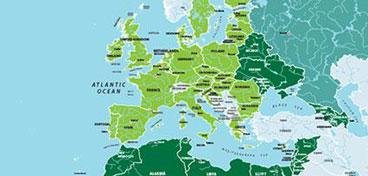

Starting from 2014, the European Neighbourhood Instrument (ENI) has replaced the European Neighbourhood Partnership Instrument (ENPI). The ENI will run until 2020 providing the framework and bulk of funding for the relations between the European Union (EU) and Partner Countries under the renewed European Neighbourhood Policy (ENP). Besides bilateral and multi-country programmes, support will be granted through cross-border cooperation of which the new ENI CBC "Mediterranean Sea Basin" Programme is part.
Cooperation, peace and security, mutual accountability and a shared commitment to the universal values of democracy, the rule of law and respect for human rights, are the founding principles of the special relationship between the EU and the Neighbourhood countries of the East and the South.
The aim of that partnership should be "to establish an area of prosperity and good neighbourliness, founded on the values of the Union and characterized by close and peaceful relations based on cooperation", according to the Treaty on European Union.
Since it was launched, in 2004, the European Neighbourhood Policy (ENP) has been strengthening relations, bringing tangible benefits to both the EU and its Neighbourhood partners, including the introduction of regional initiatives and support to democratization.
Relations and goals will be further advanced through the European Neighbourhood Instrument (ENI), which has replaced the European Neighbourhood and Partnership Instrument (ENPI), so that it reflects real needs and considerations that have emerged over the years. The Regulation setting up the ENI underlines that it should give support to the implementation of the political initiatives shaping the ENP, including the Eastern Partnership and the Union for the Mediterranean.
Giving incentives and rewarding best performers, as well as offering funds in a faster and more flexible manner, are the two main principles underlying the European Neighbourhood Instrument (ENI) worth over 15 billion from 20142020.
Based on the experiences gained until today, the ENI will support the European Neighbourhood Policy (ENP) and turn decisions taken on a political level into actions on the ground.
Effective from 2014 to 2020 the ENI seeks to streamline financial support, concentrating on agreed policy objectives, and make programming shorter and better focused, so that it is more effective.
The ENI will build on the achievements of the European Neighbourhood and Partnership Instrument (ENPI) and bring more tangible benefits to both the EU and its Neighbourhood partners. It has a budget of 15.433 billion and will provide the bulk of funding to the European Neighbourhood countries through a number of programmes.
The 16 ENI Partner Countries are:
ENI South Algeria, Egypt, Israel, Jordan, Lebanon, Libya Morocco, Palestine, Syria*, Tunisia
ENI East Armenia, Azerbaijan, Belarus, Georgia, Moldova, Ukraine
* EU Cooperation with Syria is currently suspended due to the political situation
Relations with Russia: Russia has a special status, as relations with this country are not developed through the ENP, but a strategic partnership covering four common spaces. Therefore it is only eligible for ENI regional and Cross-Border Cooperation programmes, for which it co-finances projects. Bilateral cooperation with Russia is funded under the new Partnership Instrument (PI).
What makes this instrument more effective, is that, under the ENI, assistance to Neighbours will:
Become faster and more flexible, reducing the complexity and length of the programming process so that the relevance of the assistance is not undermined;
Offer incentives for best performers through the more-for-more approach that allows the EU to increase its support to those partners that are genuinely implementing what has been jointly agreed;
Be increasingly policy-driven based on the key policy objectives agreed with the partners, mainly in the ENP bilateral action plans;
Allow for greater differentiation so that the EU allocates a greater proportion of funds where aid can have the highest impact;
Aim for mutual accountability so that it takes greater account of human rights, democracy and good governance when it comes to allocating assistance.
The ENI will also encourage closer links between the EU and partner countries to enable their citizens to participate in successful EU internal programmes, such as on student mobility, youth programmes or support to civil society. Special emphasis will be given to engagement with civil society.
This funding instrument, that responds to the evolving relations between the EU and its partner countries, will continue to ensure the success of the democratisation process and improve economic and social development in the EUs immediate neighbourhood. Itwill support the reform process already undertaken by the partner countries themselves.
(1) Fostering human rights and fundamental freedoms, the rule of law, equality, sustainable democracy, good governance and a thriving civil society.
(2) Achieving progressive integration into the EU internal market and enhanced co-operation including through legislative approximation and regulatory convergence, institution building and investments.
(3) Creating conditions for well managed mobility of people and promotion of people-to-people contacts.
(4) Encouraging development, poverty reduction, internal economic, social and territorial cohesion, rural development, climate action and disaster resilience.
(5) Promoting confidence building and other measures contributing to security and the prevention and settlement of conflicts.
(6) Enhancing sub-regional, regional and Neighbourhood wide collaboration as well as Cross-Border Cooperation.
Support through the ENI is programmed and given in three different ways:
bilateral programmes covering support to one partner country;
multi-country programmes which address challenges common to all or a number of partner countries, and regional and sub-regional cooperation between two or more partner countries;
Cross-Border Cooperation programmes between Member States and partner countries taking place along their shared part of the external border of the EU (including Russia). The ENI CBC "Mediterreanane Sea Basin" Programme is part of the cross-border cooperation component of the ENI.
Some of the ENI cooperation areas that will be given high priority are:
Boosting small businesses
Civil-society engagement
Climate change action
Easier mobility of people
Energy cooperation
Gender equality promotion
Gradual economic integration
People-to-people contacts
Transport connections
Youth and employment